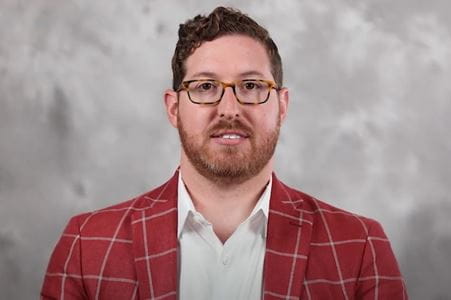Bryan M. Saltzman, MD, assistant professor of Orthopaedic Surgery at Indiana University School of Medicine has recently been named head of the Sports Medicine Division for Indiana University Orthopaedics.
Saltzman specializes in addressing complex injuries of the knee, shoulder and elbow, including ACL and multiligament reconstructions, cartilage treatments in the knee, labral and instability issues in the shoulder and UCL and throwing pathologies in the elbow. He was recruited to IU Health in 2024 after serving as head team physician for the University of Carolina at Charlotte, supporting both the Charlotte 49ers Men’s Division I athletics and the Stumptown Athletic NISA league professional soccer team. His interests include tackling the nuanced complexities of these conditions, combining clinical excellence with robust research initiatives.
“Dr. Saltzman’s advancement to head of the Sports Medicine Division is a testament to his commitment to improving orthopaedic medicine and outcomes through translational research and his care of patients who present with complex injuries,” said L. Daniel Wurtz, MD, chair of the Department of Orthopaedic Surgery. “We anticipate that through both his clinical and research practice, we will continue to elevate orthopaedic surgery practice in Indiana and beyond.”
To stay at the cutting edge of surgical advancements, Saltzman remains at the forefront of surgical techniques through innovation and personal research contributions.
“My publications on topics within my clinical expertise have provided the means for change in the way we evaluate or treat certain knee, shoulder and elbow injuries,” Saltzman said. “For instance, our research on a novel ACL reconstruction method has transitioned successfully from the lab into clinical practice, influencing other surgeons to review and consider the technique.”
“One of the most rewarding things about caring for athletes — which to me spans from the budding youth soccer athlete up through the weekend pickleball player — is that you have a particular demographic of patients that is incredibly invested in getting better because they want to return to the activities that make them most happy,” Saltzman said. “The ability to play a role in that ultimate return, and to watch an athlete's progression back to sport readiness, is really exciting.”
Saltzman highlighted injury prevention as a crucial area of excitement and importance in contemporary sports medicine. “We have an epidemic of many life- or career-altering injury patterns such as ACL tears in cutting and pivoting athletes, or UCL injuries in overhead throwers,” he noted. “As imperative as it is to further our understanding of how to optimize surgical treatment, clinical and research efforts geared toward reducing their incidence are a focal point for us as Sports Medicine practitioners.”
In his new leadership role, Dr. Saltzman expressed enthusiasm about guiding the future of the division, stating, “Our Sports Medicine & Shoulder Surgery Division is an incredibly talented group of physicians, and we are committed to patient care, research and innovation. I look forward to helping elevate not only our standing in our local community, but also enhancing our regional and national presence amongst the most respected academic sports medicine divisions in the country.”
Saltzman views his role as a team physician as both personally and professionally rewarding. “Being a team physician is a 24/7 on-call role to provide athletes with the best opportunity to compete safely and effectively,” he said. “It’s incredibly special to watch those athletes you've treated return to their sport and to be even a small part of that process.”
Saltzman also emphasized the importance of teamwork and collaboration in athlete care. “Success as a team physician requires synchronization with colleagues — including coaches, trainers, medical personnel, nutritionists, equipment managers, interns and athletes' families,” he said. “It takes a village for an athlete at any level to achieve greatness, and maintaining close relationships with each of these team members is essential to support athletes both on and off the field.”
